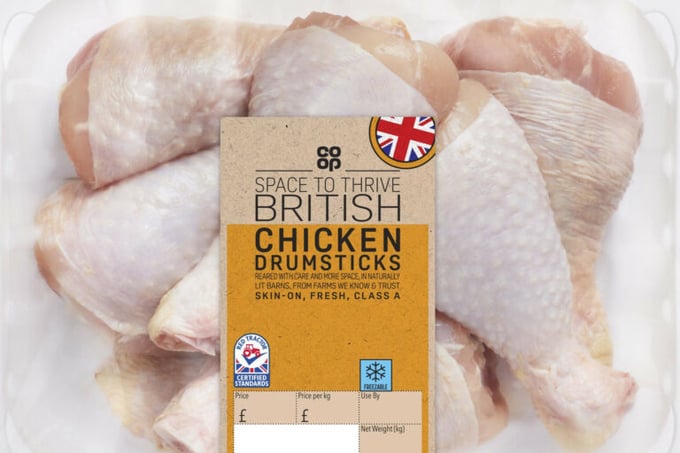November 20, 2025 | 03:24 GMT +7
November 20, 2025 | 03:24 GMT +7
Hotline: 0913.378.918
November 20, 2025 | 03:24 GMT +7
Hotline: 0913.378.918

Co-op’s ‘Space to Thrive’ range, which sees chicken reared under welfare conditions that exceed the UK standards. Photo: Co-op.
Co-op has said it has become the first UK convenience retailer to extend its improved chicken welfare standard across its British Breaded and Ready-To-Eat range, enabling Co-op members and customers to access chicken reared with more space to perch and roam.
The 21 lines, which include Coop’s British Breaded Chicken Goujons, British Garlic Kiev, British Roast Chicken Drumstick and British Sliced Chicken Breast, have now all been rebranded under the retailer’s Space to Thrive range, which sees chicken reared under welfare conditions that exceed the UK standard, with reduced stocking density and 20% more space.
It also means chickens come from naturally lit barns and have access to pecking objects and platforms for perching to enable more natural behaviours.
Responsible souring
The company, which sells only 100% British meat and poultry and free-range eggs, is amongst one of the first retailers to move its entire breaded chicken to the lower stocking density commitment alongside its fresh chicken range, which moved in February following a multi-million-pound investment.
Sinead Bell, Co-op’s commercial director, said: “Responsible sourcing matters to us, our members and customers and we’re proud to support British farmers by sourcing 100% of our fresh meat and shell eggs from trusted farms from across Britain. We take animal welfare seriously and listen to our member owners, which is why we took action earlier this year and continued to significantly invest in our poultry supply chain to offer shoppers high quality products at the same great value.”
Improved chicken range launched early
Initially announced at the Co-op AGM in May 2023, in line with their members’ requests, the convenience retailer had planned to launch the lower stocking density birds by the end of 2024, but by working closely and at pace with their supplier 2 Sisters Food Group, Co-op was able to first make the move 10 months earlier.
Now, all Co-op fresh and breaded chicken alongside 11 Ready To Eat lines are now bred to a maximum stocking density of 30kg/sqm. This is reduced from the previous specification of 38kg/sqm. All Co-op Chicken also exceeds Red Tractor standards, with RSPCA Assured Free Range chicken also available in store.
The supermarket was criticised at its AGM by members of the Humane League demanding the company end the use of the “cruel, fast-growing” chickens which are “bred to suffer”. The charity has been urging the Co-op to sign up to the Better Chicken Commitment and is set to continue to do so in spite of the latest welfare measures.
(Poultryworld)

(VAN) On November 18, Deputy Prime Minister Tran Hong Ha chaired the 22nd session of the National Steering Committee on Anti-IUU Fishing.

(VAN) Prime Minister Pham Minh Chinh has issued an official dispatch directing focused response efforts and the swift remediation of damage caused by recent floods in the Central region.

(VAN) Deputy Minister Nguyen Thi Phuong Hoa calls for prioritizing the livelihoods of coastal residents, particularly those impacted by marine economic development projects.

(VAN) People can now submit their land-use right certificates ('red books') via the VNeID application. This marks an essential step toward fully paperless public services in land administration in the near future.

(VAN) Fishermen and authorities in Khanh Hoa province are demonstrating strong resolve in the fight against IUU fishing, aiming to develop a sustainable fisheries sector and remove the European Commission's (EC) ‘yellow card.’

(VAN) Viet Nam has declared that it will develop and implement strong greenhouse gas reduction measures to achieve Net Zero emissions by 2050 and it is following through on that commitment.

(VAN) A comprehensive legal framework, tailored to domestic conditions, serves as the foundation guiding economic sectors toward low-emission development.